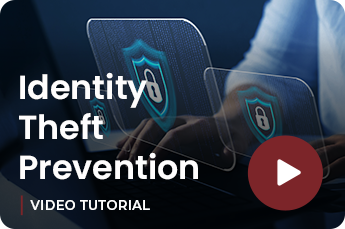Banking with Peoples State Bank is the easiest way to keep your money and information safe and secure. We want you to be aware of the current scams and fraud that are going around. If you have any questions, please call our toll-free line at 800-252-3137.
Any organization that you share your personal information with tries to protect it. Scammers have found that it’s easier to steal information from the person whose identity they want to steal.
- Have a credit report run annually to check for suspicious activity.
- Check your bank account statements online once a week to look for unauthorized activity.
- “If it is too good to be true, it probably is”. Don’t give your account information out to anybody on the phone or any other unsolicited correspondence.
- If you are wary about a phone call, text, or email you have received, call the organization a call to see if it was really them.
Here are some different ways that scammers will try to use your personal information:
{{ identity-theft-prevention }}
{beginAccordion}
Email Phishing
Phishing is a scam used to steal your personal information. If you receive an email claiming to be from Peoples State Bank, your credit card company, or another financial resource, be careful! It may look like it is from those companies, but any email asking for personal information is usually a scam. Do not click on links in this email, and don’t respond to it. Peoples State Bank will never ask you to validate personal or account information via email.
How to spot a Phishing Scam:
- Account verification or personal information requests are normally a scam.
- If the email asks you to click a link, claim a prize, or call a phone number to verify your account.
- The email will often threaten consequences if you don’t respond right away.
- The name of the sender, email address, and signature line will often not match up.
Follow these steps to avoid phishing scams:
- Never respond to the email with confidential information.
- Never click on a link that is attached in the email.
- Do not call the phone number provided in the email.
- Always use anti-virus software on your computer.
REMEMBER: Peoples State Bank will never ask for your personal information via email. Never give your full social security number, debit card number, PIN, account number, or date of birth to anybody you don’t know.
Telephone Scams
The phone is the most used source for criminal activity. You will get a phone call, and the caller claims to be from your bank, or another organization. They start asking questions about you or your account. Somebody is trying to steal your identity!
Follow these steps to protect yourself from telephone scams:
- Never give your personal information over the phone without verifying the caller’s identity.
- If you are uncertain about a caller’s identity, hang up and call a known phone number.
- Do not call any phone number received in an email or voicemail asking for personal information.
- Be highly suspicious when you are asked to provide personal information over the phone!
REMEMBER: Peoples State Bank will never ask for your personal information over the phone. Never give your full social security number, debit card number, PIN, account number, or date of birth to anybody you don’t know.
Payment Fraud
Payment fraud is when someone uses your checks, credit and debit cards, or another form of payment without your knowledge.
Here are some common tips to avoid being a victim of payment fraud:
- Balance your checkbook and verify all account information as soon as possible. Check your online banking weekly to catch fraud as soon as possible.
- Keep you checks, credit and debit cards in a safe place.
- Don’t write PIN numbers on your debits cards or leave them in your wallet for a thief to find.
- Shred all documents that list your personal information to securely dispose of them.
- Make online purchases from trusted websites only. If you’re wondering about a company, check them out on the Better Business Bureau.
- Pay all your bills online through our online bill pay system. This way of paying bills is more secure than mailing paper checks.
- Always be diligent about protecting your identity. You are the first step to reducing your identity theft risk!
If suspicious charges are found on your debit card, we may contact you to confirm the charges. Please call us at 800-252-3137 if you want to discuss suspicious activity on your debit card.
Stolen Identity
Sending and receiving mail, putting your trash out at night, and leaving personal documents around your home can put your personal information at risk. All these items can be stolen from your home, mailbox, and your trash. Thieves steal this information to access your accounts and steal your identity.
Here are some tips to avoid identity theft in your home:
- Purchase a shredder. Shred account statements, checks, or anything with your personal information prior to throwing it away.
- Instead of putting your garbage out the night before pickup, put it out the morning of pickup. This gives thieves less time to go through your trash.
- Pick up your mail as soon as it is delivered or purchase a mailbox with a lock.
- Instead of putting outgoing mail in your mailbox, place outgoing mail in an official and secure mailbox.
- Store your mail, account information, and secure documents out of sight of anyone who might be at your home.
The best way to protect your identity is to learn about the simple steps you can take to avoid being a victim.
Mobile Phones
Always remember to treat your mobile device like a small computer. Small precautions you take will help protect you from fraud and theft.
- Don’t save passwords, account numbers, PINs, or any other personal information on your mobile device.
- Download antivirus software for your mobile device.
- Notify your mobile provider if you lose your phone. The sooner you report it, the sooner you are protected from fraud.
- Be careful when you’re downloading apps. Only download apps from a trusted source that is endorsed by your mobile provider.
- Be cautious when you receive text messages or emails from unknown sources that ask you to update, validate, or ask for personal details. Don’t reply to emails or text messages from people or places that you aren’t expecting them from.
- Review your bank statements as regularly as possible to check for fraudulent transactions. Contact us immediately if you notice something out of the ordinary.
- Be careful connecting to public Wi-Fi. Turn off any auto-connect features that could connect you to insecure wireless networks.
- Log out of online banking when you’ve finished using it.
- Install operating updates for your mobile device once they’ve become available. They normally include security updates.
- Delete all personal information before selling, upgrading, or recycling your device.
Mobile and online banking can be a safe and secure part of your daily life. Taking cautious measures to ensure the safety of your information is an essential part of staying on top of fraudsters.
If you have any questions about using mobile or online banking, please call us at 800-252-3137.
Helpful Links
What To Do if You Were Scammed | Consumer Advice
Internet Crime Complaint Center(IC3) | Home Page
Report Phishing | Internal Revenue Service
{endAccordion}











